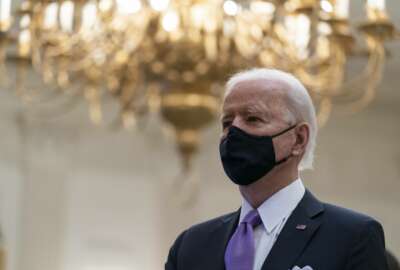Biden announces new slate of impasse panel members
President Biden announced his plans to nominate 10 new members to the Federal Service Impasses Panel, which attempts to resolve collective bargaining disputes among...
President Joe Biden on Monday announced his intention to name a completely new slate of members to the Federal Service Impasses Panel.
The panel is a component of the Federal Labor Relations Authority and is supposed to resolve gridlock between agencies and federal employee unions. Agencies and unions can request assistance from the panel with collective bargaining disputes if mediation is unsuccessful.
Federal unions have said the panel has caused or perpetuated more labor disputes than it’s resolved during the last four years.
Now the panel will get a fresh start with 10 new members, which include:
- Martin H. Malin
- Wynter P. Allen
- Jeanne Charles
- Howard Friedman
- Edward F. Hartfield
- Marvin E. Johnson
- Mark G. Pearce,
- Pamela Schwartz
- Joseph E. Slater
- Tamiko N.W. Watkins
The panel’s members don’t require Senate confirmation.
Former impasse panel member Martin Malin will serve as the chairman, the White House said.
Malin, who founded the Institute for Law and the Workplace at the Illinois Institute of Technology’s Chicago-Kent College of Law, served for eight years on the impasse panel during the Obama administration. The White House said he has published an extensive list of articles and books on labor law.
Many of Biden’s appointees have experience working for employee unions themselves.
Friedman is a former president of the National Treasury Employees Union chapter representing attorneys at the U.S. Patent and Trademark Office. He helped create USPTO’s telework program back in 1997, the White House said.
Allen, now a partner at the Alden Law Group, worked as a staff attorney for the International Brotherhood of Teamsters.
Johnson, also a former FSIP member, previously worked for the Federal Mediation and Conciliation Service, FLRA and the National Treasury Employees Union.
And Schwartz, a 35-year patent examiner, held various leadership positions at the Patent Office Professional Association, an independent labor union representing examiners and others at USPTO.
Other appointees have experience teaching and practicing labor law.
Hartfield, also a former impasse panel member during the Clinton and Obama administrations, was a Federal Mediation and Conciliation Service commissioner and has been on arbitration rosters for the National Mediation Board and state employee relations boards in Michigan, Ohio and Iowa.
Pearce is a former member and chairman of the National Labor Relations Board and taught labor law at Cornell University and Georgetown University’s Law Center. Slater has a lengthy background in employment law and teaches at the University of Toledo College of Law.
Watkins manages the administration law team and oversees the whistleblower and Freedom of Information Act programs at the Millennium Challenge Corporation.
Biden asked for the resignations of the previous 10 impasse panel members back in February. Most agreed to leave after being asked; two members were fired.
Cleaning house at the panel was a top priority for federal employee unions, who said the panel under the previous administration was unqualified and biased. The impasse panel issued several decisions during the last four years that rewrote large portions of agency-union contracts, often siding with management.
Unions and employment attorneys said agencies felt emboldened to declare impasse and take labor disputes to the panel, confident FSIP would rule in their favor.
“The FSIP was in dire need of objective labor relations professionals and this new list of appointees meets that standard,” Tony Reardon, NTEU’s national president, said Monday. “We look forward to the FSIP returning to its role as a neutral mediator in federal sector bargaining, just as Congress intended.”
The American Federation of Government Employees said it too supports Biden’s new slate of impasse panel members.
“We are confident that these members will fairly resolve labor disputes between unions and agencies and restore dignity and fairness to the panel and its important work on behalf of federal employees,” Everett Kelley, AFGE’s national president, said Monday.
Biden earlier this month began fleshing out leadership at the FLRA. He nominated Susan Tsui Grundmann, the former chairman of the Merit Systems Protection Board, as his second Democrat to serve at the authority.
Grundmann currently leads the Office of Congressional Workplace Rights and once served as the general counsel for both the National Federation of Federal Employees and the National Air Traffic Controllers Association. At NFFE, she helped fight against proposed changes to the Defense Department’s personnel system.
Biden already nominated Ernest DuBester, the long-serving FLRA member and lone Democrat on the authority during the Trump administration, to a new term. If confirmed in the Senate, he’ll serve as permanent FLRA chairman.
The president also nominated Kurt Rumsfeld, DuBester’s current chief counsel, as the authority’s general counsel. That position has been vacant for much of the last four years, rendering much of the FLRA’s findings on agency-union disputes meaningless. Only the FLRA general counsel has the authority to enforce findings from arbitrators.
Rumsfeld will also face Senate confirmation.
Copyright © 2025 Federal News Network. All rights reserved. This website is not intended for users located within the European Economic Area.
Nicole Ogrysko is a reporter for Federal News Network focusing on the federal workforce and federal pay and benefits.
Follow @nogryskoWFED






